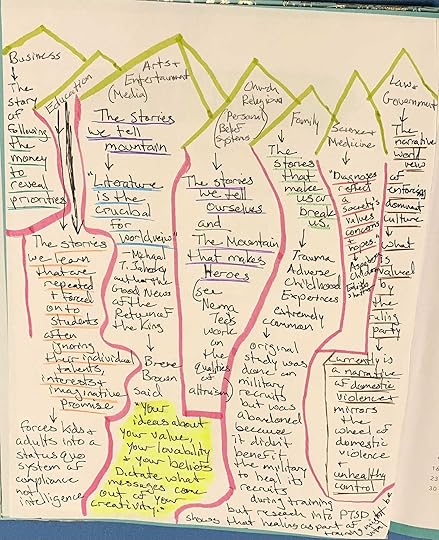Putting it all Together
There are seven mountains of stories that command society.
(Actually eight - because I thought through this and I’m really bad at math.)

They are…
Personal Belief Systems - This is not exactly a mountain on the official list, but we’re going to start here, because personal beliefs are our anchors in the belay process and we need to make certain we can trust our belay anchor.
Going through personal beliefs also lets me show you how those beliefs can change from hurtful to helpful and eventually heroic. Its an important process and its not often discussed.
The lack of discussion on how change of beliefs happens often leaves people feeling confused or frightened to make the changes they need for a better future. Since I’m a writer - you’ll be seeing that from a character perspective.
However, fictional characters do mirror real life and since we often aren’t used to looking at our lives as a heroic story, it can be difficult to pinpoint the place where we picked up that belief and then later how we knew we had to throw it out. In a fictional story, those points are often much clearer.
The other official seven mountains are:
Religious - The stories we tell ourselves and the mountains that make heroes or villians (moral code outside of us, in a smaller less than leading society culture. Anthropologists call it a ‘sub-culture’.1)
Family - the stories that make us or break us (moral code and family dynamics of value)
Education - the stories we learn that repeated and forced onto students often ignoring their individual talents, interests and imaginative promise
Arts/Entertainment/Media - The stories we tell mountain, also the stories our culture tells to us and the worldview they want us to accept
Business - business is the story of following the money to reveal priorities.
Science and Medicine - “Diagnosies reflect a society’s values, concerns and hopes.” - from the book Aspberger’s Children (Asperger's Children: The Origins of Autism in Nazi Vienna)
Law and Government - the narrative worldview of enforcing dominant culture aka what is valued by the ruling party.
We’ll go into more detail as we move forward with each mountain.
Again the four questions to ask are:
What stories are you listening to?
Who is in charge of those stories?
What do these stories teach you?
How do these stories make you feel?
Perpetual Disclaimer for this series:
I am not a counselor or a mental health professional. I am going to attempt to avoid things which will cause alarm or harm, but I can't know what will trigger each individual. If you need to speak to a mental health professional please know that there are resources available.
Your stories are amazing!
Chronic Writer
Share Chronic Writer by VintageInkSlinger
Thanks for reading Chronic Writer by VintageInkSlinger! Subscribe for free to receive new posts and support my work.
A. R. Mitchell's Goodreads Page
1Footnote: Subculture in anthropology doesn’t mean its controversial or subservise or morally questionable. Its just a culture not followed by enough people who have enough influence to make it a dominant culture. For instance, the dominant culture in the Soviet Union was Communism because it was a communist government system, but there were covert religious groups throughout the Soviet Union. Most of these were Christian, Buddhist or indigenous beliefs in Siberia. I’ve never found any research on covert practice of Islam or Judaism - but I’m certain the beliefs continued because as soon as the Soviet Union collapsed, those beliefs immediatly came back into influence in Central Asia.



